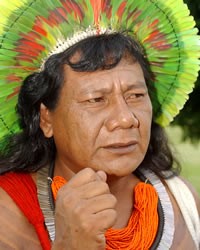Kayapo in Brazil

Photo Source:
Valter Campanato/ABr - Wikimedia
Creative Commons
|
Send Joshua Project a map of this people group.
|
| People Name: | Kayapo |
| Country: | Brazil |
| 10/40 Window: | No |
| Population: | 8,700 |
| World Population: | 8,700 |
| Primary Language: | Kayapo |
| Primary Religion: | Christianity |
| Christian Adherents: | 70.00 % |
| Evangelicals: | 35.00 % |
| Scripture: | New Testament |
| Ministry Resources: | Yes |
| Jesus Film: | Yes |
| Audio Recordings: | Yes |
| People Cluster: | South American Indigenous |
| Affinity Bloc: | Latin-Caribbean Americans |
| Progress Level: |
|
Introduction / History
The Kayapo people live the states of Pará and Mato Grosso in northwestern Brazil. They had little contact with outsiders until the 1950s.
What Are Their Lives Like?
Since the 1950s the Kayapo people have struggled to keep loggers and miners off of their land. In recent years the Kayapo communities have been more likely to have female leaders who are especially determined to keep their land. They also have Western allies who do documentaries about Kayapo people being forced off their traditional lands. They are also fighting efforts to build dams on their homeland.
What Are Their Beliefs?
Most Kayapo people are either Roman Catholic like Brazil's majority, or Evangelical. Almost all of them have a pantheistic worldview, where they are one with nature. They do not just want to preserve their jungle homeland because it is beautiful or useful; they view it as part of them as individuals and as a community.
They take great care to do rituals, which involve body painting, before a hunt or a fishing trip.
What Are Their Needs?
The Kayapo people need more political clout to protect their homeland. Logging means the trees they depend on are taken away. Mining projects usually lead to poisoning their water supply.
The Kayapo people who have already been displaced need job training to prepare them for urban Brazil.
Prayer Points
Pray for loving and practical Christians to help urban Kayapo people learn new skills so they are prepared for urban life.
Pray for the Lord's protection and provision for these vulnerable people.
Pray that soon Kayapo disciples will make more disciples, leading their community into a closer relationship with Jesus Christ.